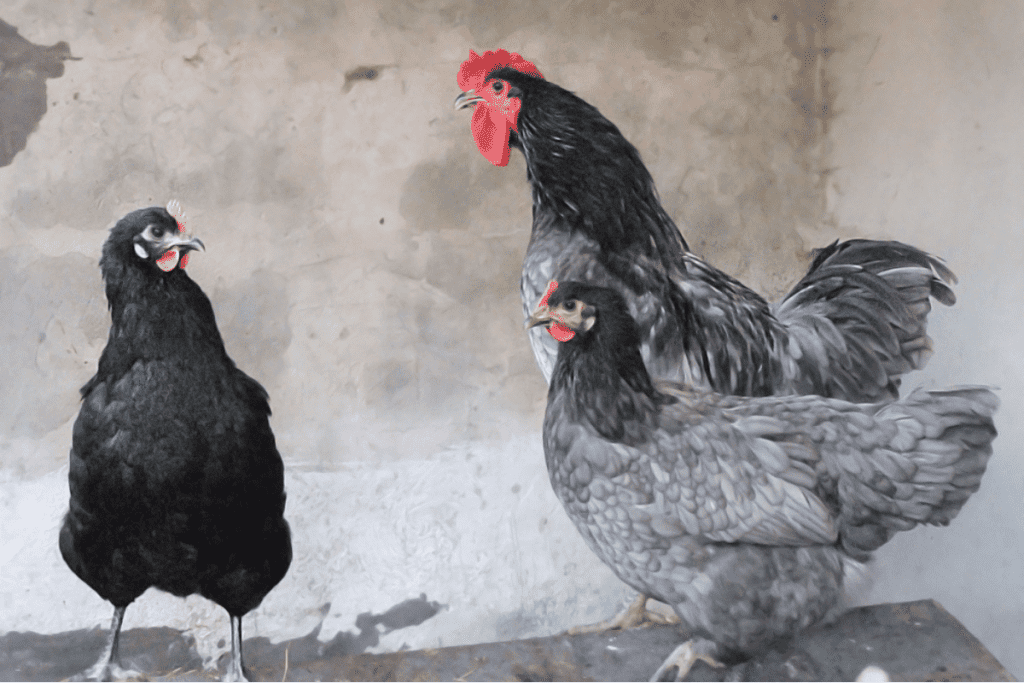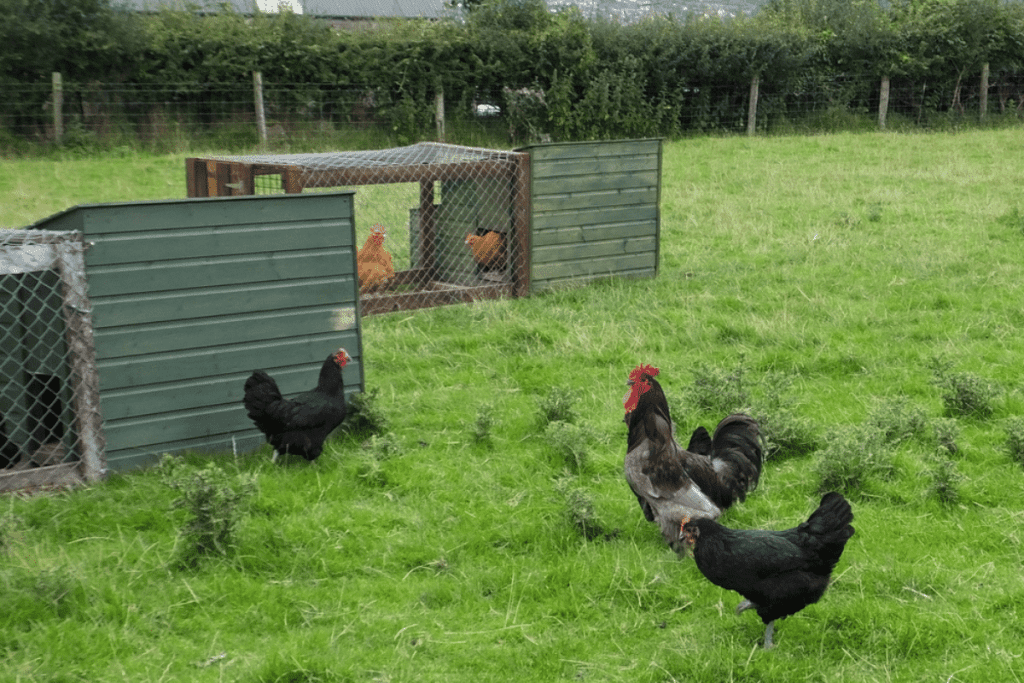Jersey Giant Chicken Eggs have been around since the late 1800s when John and Thomas Black of New Jersey decided to create larger chicken breeds to serve as both meat birds and egg layers.
These heritage breed chickens are slow growers and, as such, have gone out of favor in recent years.
However, their eggs are a lovely commodity for many backyard chicken keepers today who want a bird who can give them both great meat and eggs.
Read on to find out the basics about these extra large eggs.

Table of Contents
ToggleWhat Are Jersey Giant Chicken Eggs?
Jersey Giants produce extra large to jumbo eggs. Their egg color is light to dark brown. A Jersey Giant Chicken can lay around 2-4 extra large eggs a week once they begin to lay.
Eggs are classified by how much they weigh rather than their length or height.
Since these birds are so large, it stands to reason Jersey Giant Chickens make larger than average chicken eggs.
These eggs weigh between 60-70 grams (2.1 – 2.4 oz).
There have been barnyard stories of Jersey Giant Chicken eggs surpassing this size.
Jersey Giants tend to lay larger eggs as they get older.
Feed and living conditions also factor into how large chicken eggs get.
These are brown eggs.
They are lightly speckled but are usually solid colored.
Jersey Giant Chickens produce some of the largest brown eggs among brown egg layers.
Still, their eggs do not surpass some of the larger white chicken layers such as Minorcas or Leghorns.
By the end of the year, you’ll have anywhere from 150- 200 eggs from a single hen.
When Do Jersey Giant Chickens Start Laying Eggs?
Like many larger chicken breeds, Jersey Giant Chickens may be slow to lay. However, the different strains vary. Usually, a pullet will begin laying at around 5- 6 months of age.
Many owners begin to worry when their Jersey Giant has not started laying eggs at 1 year old, but this is not uncommon.
Jersey Giants need longer to develop since they are such large chickens.
Some strains produce earlier, with accounts claiming as early as 5 months old, but this is not the norm.
The typical period for Jersey Giants pullets to lay is between 6-8 months.
When Do Jersey Giant Chickens Lay Eggs?
Jersey Giant Chickens lay eggs throughout the year, even in winter. These hardy birds do well in cold climates and continue to produce eggs in winter. If you are looking for a good winter layer, these chickens are some of the best for laying winter eggs.
However, they do not fare well in intense heat.
The heat will slow down the production of eggs for these gentle giants.
They need a lot of ventilation in their chicken coops and plenty of water to combat those hot days.
How Do You Get A Jersey Giant Chicken To Produce More Eggs?
To get your chickens to lay more eggs, you need to ensure they are eating quality feed, have clean water and nesting boxes, have room to roam and forage, and are free from parasites.
Jersey Giants produce moderately because they are dual-purpose chickens.
Even though they produce well with meat and eggs, there is an emphasis on meat production.
These are giant chickens to meet the demand for whole poultry sales.
However, this emphasis on meat came at the expense of egg production.
Yet, Jersey Giant Chickens are relatively productive egg layers compared to their large breed compatriots.
Still, optimize their egg laying by ensuring they have the best living conditions.
Jersey Giant Chickens need a steady diet of premium pellets.
They also need a nice mix of vegetables and mealworms in their diets.
Calcium is another important part of your chicken’s diet.
To produce eggs, they need plenty of calcium.
Feed your chickens crushed oyster shells or grind some chicken eggshells to add to their feed.
They also need clean, fresh water daily.
They should have clean chicken coops and nesting boxes, as well.
Their nests should be cleaned out about once a week.
Cleanliness is important for keeping your chickens free of disease.
A healthier chicken lays more eggs.
Jersey Giants also need a place to roam.
They both need to exercise and forage.
These large chickens won’t stray too far away and are too big to get carted off by hawks.
They will forage on grass and bugs in your backyard.
The foods they forage can help them to produce more eggs.
Also, a chicken with parasites is going to produce fewer eggs.
So, these giant chickens must be checked and treated for parasites often.
Do Jersey Giant Chickens Go Broody?
Jersey Giant Chickens do not reliably go broody. As with other aspects of the Jersey Giants, different strains go broody differently. Some people claim the Black Jersey Giants are more broody than other varieties.
It doesn’t always go well when these large chickens go broody.
Although not as often as Brahma chickens, Jersey Giants crack their eggs due to their weight when they sit on them.
If you want to hatch Jersey Giant eggs, put them in an incubator.

Do You Need Special Equipment To Hatch Jersey Giant Chicken Eggs?
If you want to incubate your eggs, you will need a turkey or duck egg incubator to accommodate these large eggs. You will also need to keep these eggs separate from other broods and give them extra space to hatch and grow.
If you don’t have a lead on an incubator, check out this egg keeper on Amazon.
Jersey Giant Chicken eggs take a little longer to hatch. Most chicken eggs hatch within 21-25 days, but these extra large eggs hatch 2-3 days later than other breeds.
Jersey Giant chicks may need to be kept in separate brooders from other breeds of chicken since they will grow slower.
These baby chicks take longer to feather than many smaller chicken breeds.
So, while other birds are ready to transition to a juvenile residence, these chicks will need a couple extra weeks.
These chicks will be larger from the moment they hatch.
They will need more headroom and floor space than other breeds of chickens.
Commonly Asked Questions
Are Jersey Giant Chickens Good For Meat?
Jersey Giants are one of the best meat birds.
They were developed to be dual-purpose chickens, but their meat production is their emphasis.
White Jersey Giant Chickens are large birds measuring about 22-26″ inches tall and weighing between 11 – 15 pounds on average.
The Black varieties can weigh even more.
Their large size makes them slow growers.
This ensures these birds are healthy.
They have plenty of time to develop strong bones, organs, and muscles.
However, they take more time and resources before producing meat, which is why they are less popular nowadays.
Patient farmers usually wait until the Jersey Giant is 2 years old to butcher them.
Yet, these chickens are heavy-breasted roasting birds.
Are Jersey Giant Chickens Good For Urban Farming?
Jersey Giant Chickens need about twice the growing space as average-sized chickens.
This makes it difficult for urban farmers to have enough space for these chickens.
Jersey Giants need about 6 – 8′ square feet per bird.
They also need a larger chicken coop, more room in the nesting box, and plenty of space to roam.
If Jersey Giants do not have enough yard space to roam, they may become obese.
Are Jersey Giant Chickens Right For You?
Jersey Giants are a great addition to your farm if you live in a colder climate, have patience and time, and have lots of space.
The Jersey Giant has fallen out of favor recently because of its slow growth rate.
However, it’s this slow rate of growth that enhances its meat production.
The longer these birds take to grow and develop, the better their meat tastes.
They have broad breasts for excellent breast meat but also fantastic roasting chickens.
These beautiful chickens are also some of the healthiest breeds.
Their slow growth rate gives their bodies time to develop strong skeletal structures and muscles.
They do not do well in hotter climates, so if you live where the summers get hot, this may not be the chicken for you.
Yet, these chickens are great for colder climates.
They can tolerate pretty harsh conditions.
These large birds need plenty of space, so they would do well on a large farm.
They get along well with other chicken breeds.
They are great around children and are considered docile, friendly birds.
Chicken owners can choose from three color varieties: the White Jersey Giant, Black Jersey Giant, and Blue Jersey Giant.
The Black Jersey Giant is bigger and goes broody more than the white variety.
How useful was this post?
Click on a star to rate it!
We are sorry that this post was not useful for you!
Let us improve this post!
Tell us how we can improve this post?
